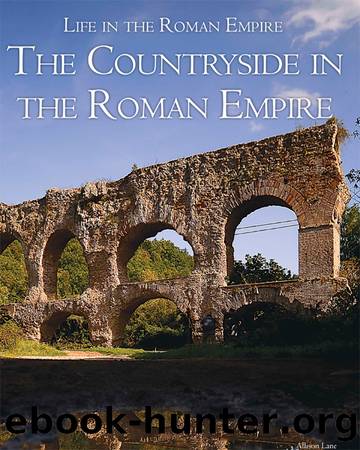The Countryside in the Roman Empire by Lane Allison;

Author:Lane, Allison; [Lane, Allison]
Language: eng
Format: epub
Publisher: Cavendish Square Publishing LLC
In November, farmers planted winter wheat and barley. December was the month for fertilizing grape vines, planting beans, and cutting wood. Moreover, olives were now ripe and ready to pick. They had to be handled carefully. Some olives were intended to be eaten, but most were pressed to make olive oil. Both the grape and olive harvests required many extra workers, so landowners or farm managers would hire local people or, in some parts of the empire, nomads to help out.
After all of this, farmers got a bit of a rest in January. They cut willow branches and reeds for basketmaking and other uses, repaired tools, and the like. Then in February it was time to start tending the grapevines and weed the grain fields, getting them ready for the next planting.
OTHER OCCUPATIONS
While most people in the countryside worked at farming, rural areas also had some craftspeople, such as carpenters and blacksmiths; service workers, such as innkeepers and bakers; and what we would call professionals, particularly doctors and veterinarians. These people might be part of the labor force on a large estate, or they might live in a village and be available to anyone in the surrounding area.
A great many herders, in some parts of the empire, lived apart from village and estate life for much of the year. In spring, they drove huge flocks of sheep or goats, or herds of cattle, up into mountain pastures, and there they stayed until autumn. This was a hard, lonely, and even dangerous existence. The herders followed their animals over steep and difficult terrain and were outdoors all day in all kinds of weather, with only little huts for shelter. As Varro wrote, âThe type of man selected for this work should be strong, swift, agile and supple of limb; men who, as well as following the flock, can also defend it against wild beasts and robbers; men able to lift loads on to the backs of pack-animals, to dash out ahead, and to hurl javelins.â
In coastal areas and around rivers and lakes, fishing was often more important than farming or herding. Some fishermen owned their own boats and equipment. Others might lease vessels and gear from someone else, in exchange for money or part of the catch. Seaside villas often included fish farms, with one or more tanks for breeding fish.
Mining was the major activity in many rural districts. Most miners were slaves or convicts, and their lives were miserable.
BOUNTIFUL HARVESTS?
Farmersâ yields depended on a number of factors: the size of their farm, the types of crops planted, and weather conditions. Perhaps the most important factor was the help they had planting and harvesting. As weâve seen, it took workers of all kinds to run a farm in ancient Romeâjust like today. In the next chapter, weâll explore what life was like for Roman men in the countryside.
Download
This site does not store any files on its server. We only index and link to content provided by other sites. Please contact the content providers to delete copyright contents if any and email us, we'll remove relevant links or contents immediately.
The Mayflower and the Pilgrims' New World by Nathaniel Philbrick(4277)
Bloody Times by James L. Swanson(4242)
I'm Still Scared by Tomie dePaola(4212)
Pocahontas by Joseph Bruchac(4024)
Bomb: The Race to Build--And Steal--The World's Most Dangerous Weapon (Newbery Honor Book) by Steve Sheinkin(3711)
Flesh and Blood So Cheap by Albert Marrin(3668)
An American Plague by Jim Murphy(3629)
Little Author in the Big Woods by Yona Zeldis McDonough(3386)
The Giant and How He Humbugged America by Jim Murphy(3286)
Hello, America by Livia Bitton-Jackson(3010)
The President Has Been Shot!": The Assassination of John F. Kennedy by Swanson James L(2969)
Harry Potter: A History of Magic by British Library(2934)
The Landing of the Pilgrims by James Daugherty(2816)
The Extraordinary Suzy Wright by Teri Kanefield(2591)
Gettysburg by Iain C. Martin(2575)
Ben Franklin's Almanac by Candace Fleming(2381)
The Impossible Rescue by Martin W. Sandler(2212)
Bloody Times: The Funeral of Abraham Lincoln and the Manhunt for Jefferson Davis by James L. Swanson(1982)
Who Was Louis Braille? by Margaret Frith(1883)
